Madikeri
Madikeri is a hill station town in Madikeri taluk and headquarters of Kodagu district in Karnataka, India. It's original name was Middurajanakeri which means "the capital of Maharaja Mudduraja".
Madikeri
Mercara | |
|---|---|
City | |
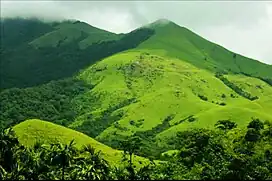 Grasslands in Kumara Parvatha, Madikeri during Monsoon season | |
| Nickname: Misty City of Karnataka | |
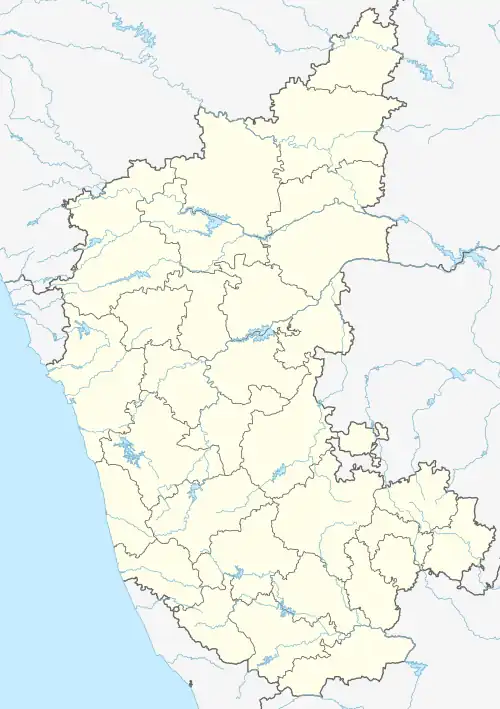 Madikeri Location in Karnataka, India  Madikeri Madikeri (India) | |
| Coordinates: 12.4209°N 75.7397°E | |
| Country | |
| State | |
| District | Kodagu |
| Region | Malenadu |
| Muddurajana Keri | 1681 |
| Founded by | Mudduraja |
| Government | |
| • Type | City Council |
| • Body | City Municipal Council |
| • CMC President | Neravanda Anita Poovaiah |
| Area | |
| • City | 17.04 km2 (6.58 sq mi) |
| • Rural | 1,435.32 km2 (554.18 sq mi) |
| Elevation _at_the_Fort | 1,170 m (3,840 ft) |
| Population (2011) | |
| • City | 33,381 [1] |
| • Rural | 113,202 |
| Languages | |
| • Administrative | Kannada |
| • Regional | Arebhashe(Kannada dialect), Kodava, Tulu |
| Time zone | UTC+5:30 (IST) |
| PIN | 571 201 |
| Telephone code | 08272 |
| Vehicle registration | KA-12 |
| Website | www |
It is recognised as one of the world's eight "hottest hotspots" of biological diversity and also one of UNSECO World Heritage.Sites[2]
Etymology
Madikeri was known as Muddu Raja Keri,[3] which meant Mudduraja's town, was named after the prominent Haleri king Mudduraja who ruled Kodagu from 1633 to 1687.[4][5] From 1834, during the British Raj, it was called Mercara. It was later renamed to Madikeri by the Government of Mysore.[6][7]
History
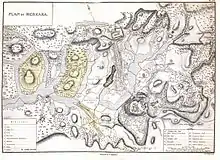
The history of Madikeri is related to the history of Kodagu. From the 2nd to the 6th century AD, the northern part of Kodagu was ruled by Kadambas. The southern part of Kodagu was ruled by Gangas from the 4th to the 11th century. After defeating the Gangas in the 11th century, Cholas became the rulers of Kodagu. In the 12th century, the Cholas lost Kodagu to the Hoysalas. Kodagu fell to the Vijayanagar kings in the 14th century.[8]
After their fall, the local chieftains like Karnambahu (Palegars) started ruling their areas directly. They were defeated by Haleri Dynasty founder Veeraraju, (Nephew of Ikkeri Sadashiva Nayaka who were descendants of Talakadu Ganga Dynasty). In the year 1700 AD Ikkeri Somashekara Nayaka gifted Puttur and Amara Sullia Magnes of Tulunadu to Haleri Kings.
Descendants of Veeraraju who are known as "Haleri Dynasty" ruled Kodagu from 1600 to 1834 AD. Haleri king Mudduraja built the Fort in Madikeri and made it[9] as their capital. Mudduraja, the third Haleri king started leveling the land around Madikeri and built a fort in the year 1681. Madikeri Fort which was original built of mud and was replaced by Tipu Sultan. Kodagu became a part of British India after 1834 AD.[10][11]
Demographics
As of 2011 India census,[12] Madikeri had a population of 33,381. Males constitute 57.2% of the population and females 42.8%. Madikeri had an average literacy rate of 85%, higher than the national average of 69.3: male literacy was 83%, and female literacy 80%. 11% of the population was under 6 years of age.
Geography and climate
Madikeri features a tropical highland climate as it has an elevation of 1,170 m (3,840 ft). Madikeri is located at 12.42°N 75.73°E.[13][14] Madikeri lies in the Western Ghats and is a popular hill station. Nearest major cities are Hassan (110 kilometres (68 mi)) to the north, Mangaluru (138 kilometres (86 mi)) to the north-west, Mysuru (120 kilometres (75 mi)) to the east and Kannur of Kerala to the west (112 km (70 mi)). The nearest international airport is Kannur International Airport which is 90 km (56 mi) away.
The mean daily minimum temperature is lowest in January at about 11 °C (52 °F). Maximum temperature in summer is around 24 to 27 °C (75 to 81 °F).[15] With the onset of the south-west monsoon, the temperature decreases in June and the weather becomes chilly. The lowest temperature recorded is 4.5 °C (40.1 °F).
| Climate data for Madikeri (1981–2010, extremes 1901–2012) | |||||||||||||
|---|---|---|---|---|---|---|---|---|---|---|---|---|---|
| Month | Jan | Feb | Mar | Apr | May | Jun | Jul | Aug | Sep | Oct | Nov | Dec | Year |
| Record high °C (°F) | 31.7 (89.1) |
32.1 (89.8) |
34.2 (93.6) |
34.2 (93.6) |
35.0 (95.0) |
32.2 (90.0) |
28.9 (84.0) |
31.0 (87.8) |
30.0 (86.0) |
30.3 (86.5) |
28.5 (83.3) |
29.0 (84.2) |
35.0 (95.0) |
| Average high °C (°F) | 26.4 (79.5) |
28.2 (82.8) |
29.8 (85.6) |
29.4 (84.9) |
27.5 (81.5) |
23.3 (73.9) |
21.6 (70.9) |
21.6 (70.9) |
23.6 (74.5) |
25.0 (77.0) |
25.3 (77.5) |
25.3 (77.5) |
25.6 (78.1) |
| Average low °C (°F) | 12.4 (54.3) |
13.1 (55.6) |
15.0 (59.0) |
17.5 (63.5) |
18.1 (64.6) |
17.6 (63.7) |
17.2 (63.0) |
17.2 (63.0) |
17.1 (62.8) |
16.9 (62.4) |
15.6 (60.1) |
13.2 (55.8) |
15.9 (60.6) |
| Record low °C (°F) | 4.8 (40.6) |
5.1 (41.2) |
7.6 (45.7) |
10.6 (51.1) |
9.4 (48.9) |
9.2 (48.6) |
8.8 (47.8) |
9.5 (49.1) |
10.0 (50.0) |
10.6 (51.1) |
7.9 (46.2) |
5.5 (41.9) |
4.8 (40.6) |
| Average rainfall mm (inches) | 1.6 (0.06) |
3.0 (0.12) |
15.0 (0.59) |
65.3 (2.57) |
128.7 (5.07) |
646.3 (25.44) |
952.5 (37.50) |
821.0 (32.32) |
274.7 (10.81) |
211.0 (8.31) |
70.8 (2.79) |
20.0 (0.79) |
3,210 (126.38) |
| Average rainy days | 0.2 | 0.3 | 1.6 | 5.0 | 7.8 | 22.2 | 27.0 | 26.2 | 16.2 | 12.2 | 4.4 | 1.1 | 124.1 |
| Average relative humidity (%) (at 17:30 IST) | 58 | 55 | 57 | 69 | 77 | 90 | 93 | 93 | 88 | 83 | 74 | 65 | 76 |
| Source: India Meteorological Department[16][17] | |||||||||||||
In 2022, Madikeri hobli received an annual rainfall of 3,957 millimetres (155.8 in).[18]
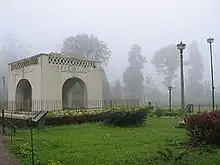
Transportation
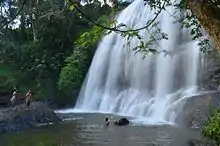
The town has only one mode of transport; The Roadways. Public transport is maintained by buses of KSRTC and other private buses. It also houses a KSRTC Bus Depot under Puttur division. Inter-district and interstate buses are handled by KSRTC, providing connectivity to cities like Mangaluru, Mysuru, Bengaluru & KIAL, Hubballi, Madurai, Coimbatore and many more other minor cities. Nearest international airports are Kannur International Airport and Mangalore International Airport at 90 kms and 140 kms, respectively.
Highways
The SH-88 was upgraded to NH-275 (subsidiary of NH-75) making it the only National Highway passing through the district of Kodagu. NH-275 connects Madikeri to Mysuru and Bengaluru due east and to Mangaluru due west. Other state highways passing through Madikeri are SH-27 (Virajpet-Byndoor) and SH-89 (Madikeri-Kutta).
Tourist Attractions
- Raja's Seat
- Sri Omkareshwara Temple
- Madikeri Fort
- Gaddide (Raja's Tomb)
- General Thimmaiah War Museum
- Abbey Falls
- Mandalpatti view point
- Pushpagiri Wildlife Sanctuary
References
- "Census Data Handbook 2011" (PDF). Retrieved 1 September 2023.
- https://www.smh.com.au/traveller/inspiration/india-western-ghats-coorg-villas-and-ayurvedic-spa-in-a-world-heritage-biodiverse-hotspot-20190620-h1fk4k.html
- Coorg History Archived 2009-04-26 at the Wayback Machine
- Kushalappa, Mookonda (2018). 1785 Coorg. Madikeri, Kodagu: Codava Makkada Coota.
- Kushalappa, Mookonda (2013). The early Coorgs. Chennai: Notion Press.
- Kushalappa, Mookonda Nitin (2018). Kodagu principality vs British Empire. Madikeri, Kodagu: Codava Makkada Coota.
- Kushalappa, Mookonda (2014). Long ago in Coorg. Chennai: Pothi.
- Kushalappa, Mookonda (2013). The early Coorgs. Chennai: Notion Press.
- Puttur Anantharaja Gowda (2015). IN PURSUIT OF OUR ROOTS.
- Jerry Dupont, The Common Law Abroad, Wm. S. Hein Publishing, 2001, ISBN 0-8377-3125-9, from p 592
- Kushalappa, Mookonda, Nitin (2018). Kodagu principality vs British empire. Codava Makkada Coota.
{{cite book}}: CS1 maint: multiple names: authors list (link) - "Census of India 2001: Data from the 2001 Census, including cities, villages and towns (Provisional)". Census Commission of India. Archived from the original on 16 June 2004. Retrieved 1 November 2008.
- Madikeri, FallingRain.com
- "Maps, Weather, and Airports for Madikeri, India". www.fallingrain.com.
- Ground Water Information Booklet, Ministry of Water Resources, 2007. Retrieved 23 June 2011.
- "Station: Madikeri/Mercara Climatological Table 1981–2010" (PDF). Climatological Normals 1981–2010. India Meteorological Department. January 2015. pp. 489–490. Archived from the original (PDF) on 5 February 2020. Retrieved 19 April 2020.
- "Extremes of Temperature & Rainfall for Indian Stations (Up to 2012)" (PDF). India Meteorological Department. December 2016. p. M99. Archived from the original (PDF) on 5 February 2020. Retrieved 19 April 2020.
- "Annual State Report 2022" (PDF). Retrieved 26 July 2023.
External links
 Madikeri travel guide from Wikivoyage
Madikeri travel guide from Wikivoyage- Madikeri.org: Portal on Madikeri and Coorg
- Madikeri: History and Architecture